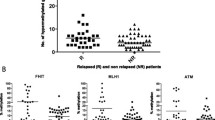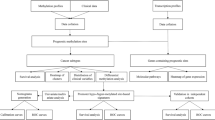Abstract
The growing understanding of the epigenetic changes associated with cancer, including aberrant promoter methylation of tumor suppressor genes that afford selective growth advantages to human neoplasms, suggests that the characterization of gene methylation patterns among gastrointestinal stromal tumors (GISTs) may be useful for predicting tumor behavior. Thirty-eight c-kit-positive gastric stromal tumors were subjected to methylation-specific polymerase chain reaction (MSP) to detect promoter methylation associated with 11 candidate tumor suppressor genes (p16/INK4a, APC, MGMT, hMLH1, p73, E-cadherin, RAR-β, RASSF1A, RB, ER, and DAPK), established to have a role in tumorigenesis of several solid human organs. Aberrant methylation of any of the 11 candidate tumor suppressor genes was detected in 84% of all GISTs. In decreasing order of frequency, the six most commonly methylated genes were: MGMT (47%), p16 (45%), RASSF1A (40%), E-cadherin (37%), hMLH1 (34%), and APC (31%). For all of the GISTs, promoter methylation was less reliable than tumor mitotic rate in predicting 5-year tumor-free survival for the GISTs; however, E-cadherin methylation was a multivariate prognostic factor for early recurrence of GISTs (50% at 2 years; P = 0.030). Among the mitotically active (>5 per 50 high-power field), histologically indistinguishable GISTs, E-cadherin methylation was an independent predictor of tumor-related mortality: 5-year disease-free survival was worse for the E-cadherin methylated GISTs (19%) compared to the E-cadherin unmethylated tumors (71%; P = 0.010). Detection of methylation within selected genes may afford a reliable and accurate molecular marker system for predicting neoplastic behavior among GISTs. This study supports the methylation status of E-cadherin as a prognostic marker for early GIST recurrence and survival.
Similar content being viewed by others
References
Trupiano JK, Stewart RE, Misick C, Appelman HD, Goldblum JR. Gastric stromal tumors: A clinicopathologic study of 77 cases with correlation of features with nonaggressive and aggressive clinical behaviors. Am J Surg Pathol 2002;26:705–714.
Singer S, Rubin BP, Lux ML, Chen CJ, Demetri GD, Fletcher CD, Fletcher JA. Prognostic value of KIT mutation type, mitotic activity, and histologic subtype in gastrointestinal stromal tumors. J Clin Oncol 2002;20:3898–3905.
Joensuu H, Roberts PJ, Sarlomo-Rikala M, Andersson LC, Tervahartiala P, Tuveson D, Silberman S, Capdeville R, Dimitrijevic S, Druker B, Demetri GD. Effect of the tyrosine kinase inhibitor STI571 in a patient with a metastatic gastrointestinal stromal tumor. N Engl J Med 2001;344:1052–1056.
Buchdunger E, Cioffi CL, Law N, Stover D, Ohno-Jones S, Druker BJ, Lydon NB. Abl protein-tyrosine kinase inhibitor STI571 inhibits in vitro signal transduction mediated by c-kit and platelet-derived growth factor receptors. J Pharmacol Exp Ther 2000;295:139–145.
Heinrich MC, Corless CL, Duensing A, McGreevey L, Chen CJ, Joseph N, Singer S, Griffith DJ, Haley A, Town A, Demetri GD, Fletcher CD, Fletcher JA. PDGFRA activating mutations in gastrointestinal stromal tumors. Science 2003;299:708–710.
Rubin BP, Singer S, Tsao C, Duensing A, Lux ML, Ruiz R, Hibbard MK, Chen CJ, Xiao S, Tuveson DA, Demetri GD, Fletcher CD, Fletcher JA. KIT activation is a ubiquitous feature of gastrointestinal stromal tumors. Cancer Res 2001; 61:8118–8121.
Jones PA, Laird PW. Cancer epigenetics comes of age. Nat Genet 1999;21:163–167.
Jones PL, Veenstra GJ, Wade PA, Vermaak D, Kass SU, Landsberger N, Strouboulis J, Wolffe AP. Methylated DNA and MeCP2 recruit histone deacetylase to repress transcription. Nat Genet 1998;19:187–191.
Antequera F, Boyes J, Bird A High levels of de novo methylation and altered chromatin structure at CpG islands in cell lines. Cell 1990;62:503–514.
Li E, Beard C, Jaenisch R. Role for DNA methylation in genomic imprinting. Nature 1993;366:362–365.
Steenman MJ, Rainier S, Dobry CJ, Grundy P, Horon IL, Feinberg AP. Loss of imprinting of IGF2 is linked to reduced expression and abnormal methylation of H19 in Wilms’ tumour. Nat Genet 1994;7:433–439.
Baylin SB, HermanJG, Graff JR, Vertino PM, Issa JP. Alterations in DNA methylation: A fundamental aspect of neoplasia. Adv Cancer Res 1998;72:141–196.
Herman JG, Umar A, PolyakK, Graff JR, Ahuja N, IssaJP, Markowitz S, Willson JK, Hamilton SR, Kinzler KW, Kane MF, Kolodner RD, Vogelstein B, Kunkel TA, Baylin SB. Incidence and functional consequences of hMLH1 promoter hypermethylation in colorectal carcinoma. Proc Natl Acad Sci U S A 1998;95:6870–6875.
Caca K, Feisthammel J, Klee K, Tannapfel A, Witzigmann H, Wittekind C, Mossner J, Berr F. Inactivation of the INK4a/ ARF locus and p53 in sporadic extrahepatic bile duct cancers and bile tract cancer cell lines. Int J Cancer 2002;97:481–488.
Belinsky SA, Nikula KJ, Palmisano WA, Michels R, Saccomanno G, Gabrielson E, Baylin SB, Herman JG. Aberrant methylation of p16(INK4a) is an early event in lung cancer and a potential biomarker for early diagnosis. Proc Natl Acad Sci U S A 1998;95:11891–11896.
Ueki T, Toyota M, Sohn T, Yeo CJ, Issa JP, Hruban RH, Goggins M. Hypermethylation of multiple genes in pancreatic adenocarcinoma. Cancer Res 2000;60:1835–1839.
Ueki T, Toyota M, Skinner H, Walter KM, Yeo CJ, IssaJP, Hruban RH, Goggins M. Identification and characterization of differentially methylated CpG islands in pancreatic carcinoma. Cancer Res 2001;61:8540–8546.
BaekMJ, KangH, Kim SE, ParkJH, Lee JS, PaikYK, Kim H. Expression of hMLH1 is inactivated in the gastric adenomas with enhanced microsatellite instability. Br J Cancer 2001;85: 1147–1152.
Cunningham JM, Christensen ER, Tester DJ, Kim CY, Roche PC, Burgart LJ, Thibodeau SN. Hypermethylation of the hMLH1 promoter in colon cancer with microsatellite instability. Cancer Res 1998;58:3455–3460.
Huang TH, Perry MR, Laux DE. Methylation profiling of CpG islands in human breast cancer cells. Hum Mol Genet 1999;8:459–470.
Newman PL, Wadden C, Fletcher CD. Gastrointestinal stromal tumours: Correlation of immunophenotype with clinicopathological features. J Pathol 1991;164:107–117.
Suster S, Sorace D, Moran CA. Gastrointestinal stromal tumors with prominent myxoid matrix. Clinicopathologic, immunohistochemical, and ultrastructural study of nine cases of a distinctive morphologic variant of myogenic stromal tumor. Am J Surg Pathol 1995;19:59–70.
Esteller M, Sanchez-Cespedes M, Rosell R, Sidransky D, Baylin SB, Herman JG. Detection of aberrant promoter hypermethylation of tumor suppressor genes in serum DNA from non-small cell lung cancer patients. Cancer Res 1999;59:67–70.
Herman JG, Graff JR, Myohanen S, Nelkin BD, Baylin SB. Methylation-specific PCR: Anovel PCR assay for methylation status of CpG islands. Proc Natl Acad Sci U S A 1996; 93:9821–9826.
Palmisano WA, Divine KK, Saccomanno G, Gilliland FD, Baylin SB, Herman JG, Belinsky SA. Predicting lung cancer by detecting aberrant promoter methylation in sputum. Cancer Res 2000;60:5954–5958.
House MG, Guo M, Iacobuzio-Donahue C, Herman JG. Molecular progression of promoter methylation in intraductal papillary mucinous neoplasms (IPMN) of the pancreas. Carcinogenesis 2003;24:193–198.
Kaplan E, Meier P. Nonparametric estimation from incomplete observations. J Am Stat Assoc 1958;53:457–481.
Peto R, Peto R. Asymptomatically efficient rank invariant test procedures. J R Stat Soc 1972;34:185–206.
Larsen F, Gundersen G, Lopez R, Prydz H. CpG islands as gene markers in the human genome. Genomics 1992;13:1095–1107.
Esteller M, Corn PG, Baylin SB, Herman JG. A gene hypermethylation profile of human cancer. Cancer Res 2001;61:3225–3229.
DeMatteo RP, Lewis JJ, Leung D, Mudan SS, Woodruff JM, Brennan MF. Two hundred gastrointestinal stromal tumors: Recurrence patterns and prognostic factors for survival. Ann Surg 2000;231:51–58.
Miettinen M, Sarlomo-Rikala M, Lasota J. Gastrointestinal stromal tumors: Recent advances in understanding of their biology. Hum Pathol 1999;30:1213–1220.
Sandberg AA, Bridge JA Updates on the cytogenetics and molecular genetics of bone and soft tissue tumors. Synovial sarcoma. Cancer Genet Cytogenet 2002;133:1–23.
Barratt PL, SeymourMT, Stenning SP, Georgiades I, Walker C, Birbeck K, Quirke P. DNA markers predicting benefit from adjuvant fluorouracil in patients with colon cancer: A molecular study. Lancet 2002;360:1381–1391.
Samowitz WS, Curtin K, Ma KN, Schaffer D, Coleman LW, LeppertM, Slattery ML. Microsatellite instability in sporadic colon cancer is associated with an improved prognosis at the population level. Cancer Epidemiol Biomarkers Prev 2001; 10:917–923.
Okuyama T, Maehara Y, Kabashima A, Takahashi I, Kakeji Y, Sugimachi K. Combined evaluation of expressions of p53 and p21 proteins as prognostic factors for patients with gastric carcinoma. Oncology 2002;63:353–361.
Font A, Abad A, Monzo M, Sanchez JJ, Guillot M, Manzano JL, Pinol M, Ojanguren I, Rosell R. Prognostic value of Kras mutations and allelic imbalance on chromosome 18q in patients with resected colorectal cancer. Dis Colon Rectum 2001;44:549–557.
EstellerM, Gonzalez S, Risques RA, Marcuello E, Mangues R, Germa JR, Herman JG, Capella G, Peinado MA. K-ras and p16 aberrations confer poor prognosis in human colorectal cancer. J Clin Oncol 2001;19:299–304.
Pajkos G, Kiss I, Sandor J, Ember I, Kishazi P. The prognostic value of the presence of mutations at the codons 12, 13, 61 of K-ras oncogene in colorectal cancer. Anticancer Res 2000;12:1695–1701.
Park TJ, Han SU, Cho YK, Paik WK, Kim YB, Lim IK. Methylation of O(6)-methylguanine-DNA methyltransferase gene is associated significantly with K-ras mutation, lymph node invasion, tumor staging, and disease free survival in patients with gastric carcinoma. Cancer 2001;92:2760–2768.
Perl AK, Wilgenbus P, Dahl U, Semb H, Christofori G. A causal role for E-cadherin in the transition from adenoma to carcinoma. Nature 1998;392:190–193.
Hawkins N, Norrie M, Cheong K, Mokany E, Ku SL, Meagher A, O’Connor T, Ward R. CpG island methylation in sporadic colorectal cancers and its relationship to microsatellite instability. Gastroenterology 2002;122:1376–1387.
Furukawa T, Konishi F, Masubuchi S, Shitoh K, Nagai H, Tsukamoto T. Densely methylated MLH1 promoter correlates with decreased mRNA expression in sporadic colorectal cancers. Genes Chromosomes Cancer 2002;35:1–10.
Author information
Authors and Affiliations
Corresponding author
Additional information
Supported in part by a grant from the Niarchos Surgical Research Fund of the Stavros S. Niarchos Foundation (M.G.H.) and National Cancer Institute grant CA-84986 from the Early Detection Research Network (J.G.H.).
Rights and permissions
About this article
Cite this article
House, M.G., Guo, M., Efron, D.T. et al. Tumor suppressor gene hypermethylation as a predictor of gastric stromal tumor behavior. J Gastrointest Surg 7, 1004–1014 (2003). https://doi.org/10.1016/j.gassur.2003.08.002
Issue Date:
DOI: https://doi.org/10.1016/j.gassur.2003.08.002




